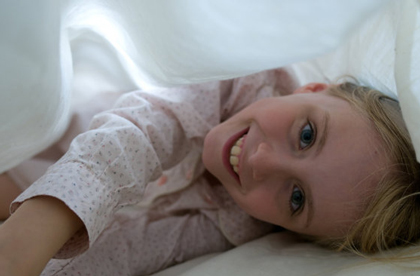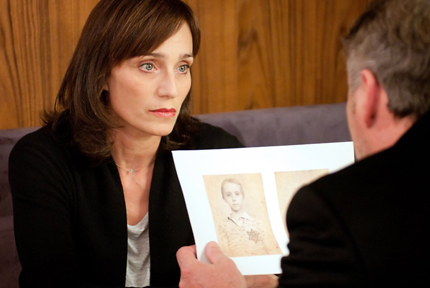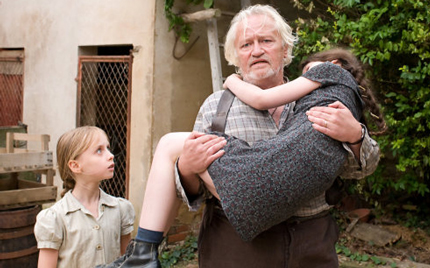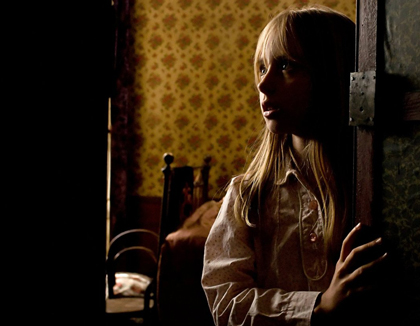
 |
|
|
|
Movies make history come alive, but they also tend to distort unpleasant or controversial stories from the past. After a few decades of cinematic simplifications about Nazi crimes in Europe during WW2, a more accurate picture began to emerge of what went on in occupied countries. Dedicated resistance fighters did oppose the Germans in France, but the bigger picture was far more complicated, and ugly. Marcel Ophuls' documentary The Sorrow and the Pity is the key film to see, but since then other great filmmakers like Claude Chabrol (Story of Women) have dared to tell the truth about collaboration with the Nazis in narrative stories. Although the Gestapo spearheaded the anti-resistance units, the French authorities undertook the roundup and deportation of hundreds of thousands of Jews almost completely on their own. Rank & file French policemen raided neighborhoods, packing men, women and children into crowded holding areas before shipping them East in railroad cars. German commanders are on record as being shocked at the French authorities' willingness to cooperate, when almost every other occupied country resisted the "legal" exportations, or at least put up a token protest or obstruction. It is said that the average Frenchman was more anti-Semitic than the average German. 
Any film about this contentious chapter in infamy needs to tread lightly, respecting the facts and avoiding exploitative effects. Gilles Paquet-Brenner's Sarah's Key, an adaptation of a best-selling novel by Tatiana Rosnay, is both a compelling mystery and an eye-opening history lesson. It is told as a mystery unraveled sixty years after the events. Assigned to do a story on aspects of the occupation long considered too 'inconvenient' for the mainstream press, journalist Julia Jarmond (Kristin Scott Thomas) uncovers a pertinent mystery in her own family. American Julia is married to the architect Bertrand Tezac (Frédéric Pierrot). He's refurbishing the family's old Paris apartment for Julia in expectation of leaving for a year to work on a big project in China. Julia's magazine story focuses on the 1942 roundup and detention of thousands of Parisian Jews in a bicycle racetrack stadium called the Vel' d'Hiv (Winter Velodrome). Apartments in Paris were almost impossible to come by, but the Tezacs acquired theirs only a few days after the roundup began. Working with documentation experts, Julia becomes obsessed with finding out what happened to ten year-old Sarah Starzynski (Mélusine Mayance), a child of the previous tenants. Her parents died in concentration camps but Sarah and her little brother Michel remain unaccounted for. Julia's search unravels a frightening story about Sarah's fight for survival. The small girl escaped from a detention camp and was taken in by a farming couple, Jules and Geneviève Dufaure (Niels Arestrup & Dominique Frot). The terrible choices Sarah had to make force Julia to put her own personal problems in perspective -- her marriage is breaking up because she has become pregnant and her husband doesn't want another child. The evidence leads Julia to believe that Sarah married an American, and may be alive and living in New York City, Julia's own hom town. 
The first thing that strikes one about Sarah's Key is how efficiently its story of events in the present is balanced with flashbacks to the dark times in the middle of the war. Julia is acutely aware that her own personal issues are not comparable with the drastic tragedies visited on the Starzynskis, who are powerless to save themselves. Little Sarah is a precocious, fast-thinking (and lucky) little girl who is unable to help her family. Crammed into the Velodrome without water or food or restrooms, panic ensues. Sarah witnesses a suicide. An attractive young woman on the bench next to them has managed to help her family escape by surrendering herself in their place, in the belief that being alone and attractive may give her a way out. She tells Sarah that if she wants to survive, to "think only of herself." Sarah's energy (and to a great degree, her ignorance) buoys her spirits. But she's haunted by a split-second decision she made when the French police came to arrest her family -- she locked her brother in a hidden closet and kept the key, assuming she'd be back son to let him out. Sarah is convinced that little Michel will follow her instructions and stay quiet until her return. Taking the initiative, Sarah appeals to a French detention camp guard to help her escape. She then has the great fortune to find the Dufaure family at just the right time. Months later, she talks them into taking her to Paris, to free her brother from the closet... Sarah's Key makes beautiful use of the often overused flashback format. We seem to glide into the past at just the right moments, leaving the modern Paris of glass and steel for the older city of the occupation. The timing of events makes it possible to streamline the narrative so that a minimum of explanatory exposition is required. Unlike Sarah-in-the-past, Julia and her friends live in relatively luxurious surroundings, and Julia's own teenaged daughter is shielded from most insecurities. Julia's 20-something co-workers at the magazine know little about the occupation and don't really care, as to them anything so far in the past might as well be ancient history. Julia also encounters resistance from her in-laws. The generation that lived through the events either hasn't admitted that anything wrong happened, or doesn't want to pass their guilt and sadness on to their children. The great self-deception is everywhere -- we would never have tolerated such horrors as what was done to the Jews. That could never happen to us today. 1 
As Julia tracks down the elusive Sarah, she finds a spectrum of human attitudes that the horror of war has left behind. People who really aren't guilty feel guilty anyway, just for having benefited from the arrests after the fact. Julia discovers that Sarah changed her name and tried to erase her past, unsuccessfully. When Julia informs Sarah's grown son (Aidan Quinn) about her mother's true identity, she is abruptly and rudely rebuffed. To its credit, Sarah's Key never becomes yet another "inspirational" survival story with its attendant pat messages and morals. But Sarah's example does provide Julia with a perspective on her own situation. At the age of ten, Sarah made a series of desperately vital instinctive choices, most of which were good. Julia learns to forego her chi-chi Parisian lifestyle to instead devote herself to the welfare of her new loved one (likewise locked in a closet of sorts). There are useful, positive lessons to be learned from the past tragedies of other people. Sarah's Key is a great picture. Director Gilles Paquet-Brenner handles his cast extremely well. Kristin Scott Thomas meshes well with the native French actors and makes Julia seem both sane and humane at all times -- drawn to solve the mystery but by no means obsessed. Little Mélusine Mayance comes off as a precocious kid quick to play roles and eager to figure out the way to make everything turn out right. The formative 'survival' scene is in the Velodrome, where Sarah realizes that the French woman who escapes thought for herself and took bold action, unlike her own parents, who are paralyzed by the inability for the three of them to escape as a unit. They of course end up forcibly separated anyway. The irony is that if little brother Michel were with her, Sarah would have stayed with him, rather than escape. We can see the thought process behind Sarah's choices, as portrayed by Little ms. Mayance. Sarah notices that she's caught the eye of a ferocious-looking guard. She takes the chance that the man's interest is positive, begs for help, and is rewarded with a minor miracle. Niels Arestrup & Dominique Frot turn Sarah and her sick friend away, but Sarah behaves like a cat, hiding in the old couple's barn so as to give them time to regret their rash action. Just a few minutes with this girl, and the Defaures are risking their lives for her. Only children inspire this kind of selflessness. Sarah is a walking illustration of the notion that "children are man at his strongest. They abide." Tragedy comes when the horrors of childhood weigh too heavily on the adult Sarah. Sometimes no amount of adult security can repair the psychic damage. 
Sarah's Key is a very attractive film that moves quickly between scenes and uses its special effects sparingly to sketch past events. For a film without a forced "happy" ending, it leaves the viewer feeling fulfilled and edified. Anchor Bay and the Weinstein Company's Blu-ray of Sarah's Key is a flawless transfer and encoding of this fine film. It received one of those barely-publicized theatrical releases that seems intentionally aimed at obscurity. I realize that the subject matter may not be the stuff of popcorn matinees, but if movies like this go away we'll be left with nothing but abysmal comedies and outrageously overproduced special effects fluff. The only real extra on the disc is a series of making-of featurettes that inspire our admiration for the filmmakers. The director works with his interesting cast, especially the fascinating, charming young Miss Mayance. The Velodrome turns out to be a beautiful part-digital illusion -- all the filmmakers had to work with was a hundred feet or so of stadium seating. Sarah's Key gets a strong recommendation.
On a scale of Excellent, Good, Fair, and Poor,
Sarah's Key Blu-ray rates:
Footnote:
1. It seems altogether too similar that General Pinochet ( with his CIA advisors ) in Chile in 1973 would round up all the Chilean dissidents they could find and sequester them -- in a sports stadium. And although the situation is not exactly comparable, the abandoning of all those New Orleans residents in that domed Stadium during the Katrina disaster, with no coordinated effort to help them, smells of the same arrogant indifference to human suffering.
Reviews on the Savant main site have additional credits information and are often updated and annotated with reader input and graphics. Also, don't forget the 2011 Savant Wish List. T'was Ever Thus.
Review Staff | About DVD Talk | Newsletter Subscribe | Join DVD Talk Forum |
| ||||||||||||||||||